What exactly IS ringworm? It sounds gross!
Ringworm is a fungal infection affecting the skin, hair and occasionally nails of animals (and people). It manifests itself on kittens generally on the head, around the eyes, ears, feet and tail in round areas of hair loss that are rough and scaly.
It is NOT a worm, as the name may lead you to believe. In fact, it is very closely related to Athlete’s Foot found commonly in humans. While it is a zoonotic infection – meaning it can be passed between species – it most commonly affects young animals and those with suppressed immune systems. Young kittens are notorious for not grooming as effectively, which is why we see it more often in kittens brought to shelters like PAWS.
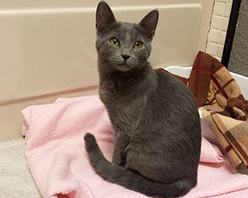
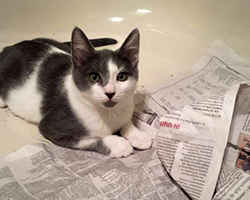
These kittens are happy to have a space to stay larger than a cage!
It is not as scary as it may sound!
If you were to search ringworm on the internet, you’ll find lots of scary pictures and clinical information that makes it sound very difficult to deal with; however, it is not as hard to handle as it sounds, and the Foster Care Team are here to support you every step of the way.
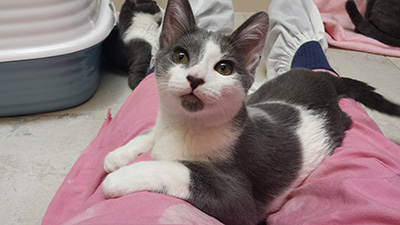
Foster parents snuggle these cuties to help them heal faster!
Our current Ringworm foster families had this to say about their experience:
“We do this because there are so few people who are willing to do it. We must have close to a couple dozen under our belt now.”
“This has honestly turned out to be one of the most rewarding experiences for me. Because treatment takes longer than normal fosters, you get to know the kitties better, and watch them go from sad little sickies to beautiful, happy kittens… Mostly, remember that good immune systems are ultimately what will help them get better, so all of the love and play you offer them will only make them healthier.”
What does a foster home need to be prepared to treat kittens with ringworm?
- Ideally, the animals are kept in a space in the home that you can completely clean with bleach or a specific hydrogen peroxide-based product that kills the fungus.
- This could be a spare bathroom, a utility room, or a room where there is limited furniture and wood floors or linoleum.
- Can you foster ringworm if you have carpet? Yes, but it is harder to keep clean, and more difficult to keep the spores out of. It would not be ideal.
- Linens and items you are able to use especially for fostering (PAWS can help provide some of these).
- Food, litter and litterbox, and toys for your foster animals (PAWS can help provide some of these).
- If you have other pets, they absolutely need to be kept separated due to the degree of contagion. So no socializing of your foster kittens with other animals in your home.
- Understanding. The amount of handling does not have to be limited, but you need to take extra precautions when handling the kittens (no rubbing their fur on your face!) and being diligent about washing before interacting with others after handling the infected kittens.
- Patience. It can be difficult to keep kittens for a few months and not get attached to them, but rest assured they will find forever homes, and you helped them with that!
- Love and affection! These kittens need just as much love and socialization as the next kitten, they just happen to require a different kind of care.
- It’s best to not have someone in the household who has a compromised immune system that could be susceptible to getting infections.
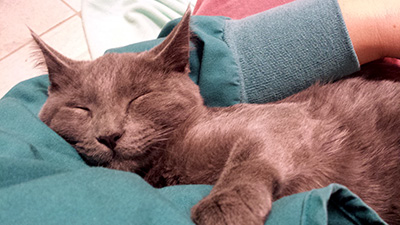
Jenny the kitten enjoys some socializing with her foster mom
What is provided to the foster home?
- Medication and treatment for the fungal infection – lime dip and oral medication
- Instructions on the treatment process
- A handy Starter Kit to help you prepare your house
- Support from the medical and foster staff every step of the way
- Kittens! Cute, fluffy, adorable felines!!
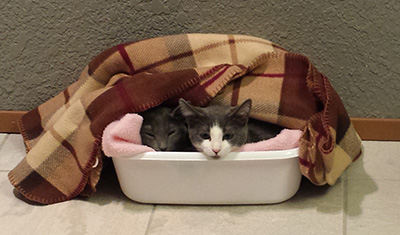
Kittens snuggling in after their lime dip treatment
Why should I consider helping?
- Every foster parent is a true life-saver!
- Due to exposure risks for the other animals, shelters have to handle cases of ringworm in a very regimented way, isolating the animals and limiting contact with them since we are handling so many other animals. This is a rather sad situation for kittens who need lots of attention, love and playtime.
- Shelters are a high stress environment, and animals tend to get healthy and stay healthy in a less stressful home environment.
- It takes staff time to manage and care for the animals, which is we rely on foster homes to help with kittens in general – and specifically those with ringworm. This allows the staff to do all of the other animal care, assist customers, and get the animals who are ready for adoption on their way into new homes!
- You and your family will be taking on a challenge that not everyone can do – and you’ll get a special plaque acknowledging your efforts!
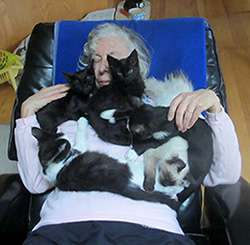
Once your kittens have negative fungal cultures, you can snuggle with them like this!
If you have questions, or would like further information about this foster care need, please e-mail foster@paws.org or call 425.787.2500 x822 and speak with our Foster Care Team.